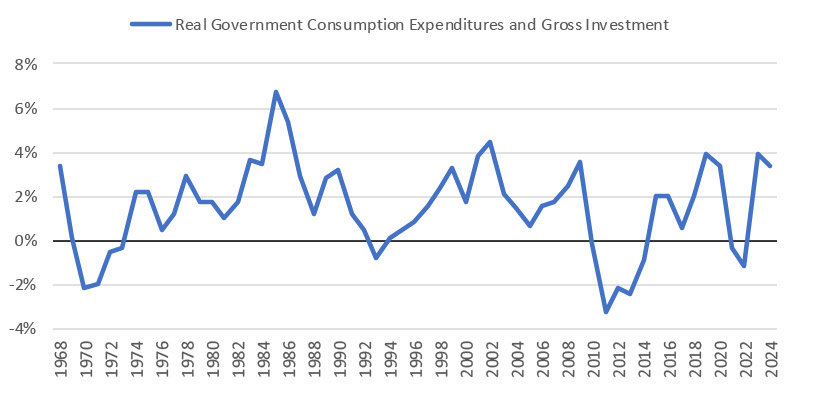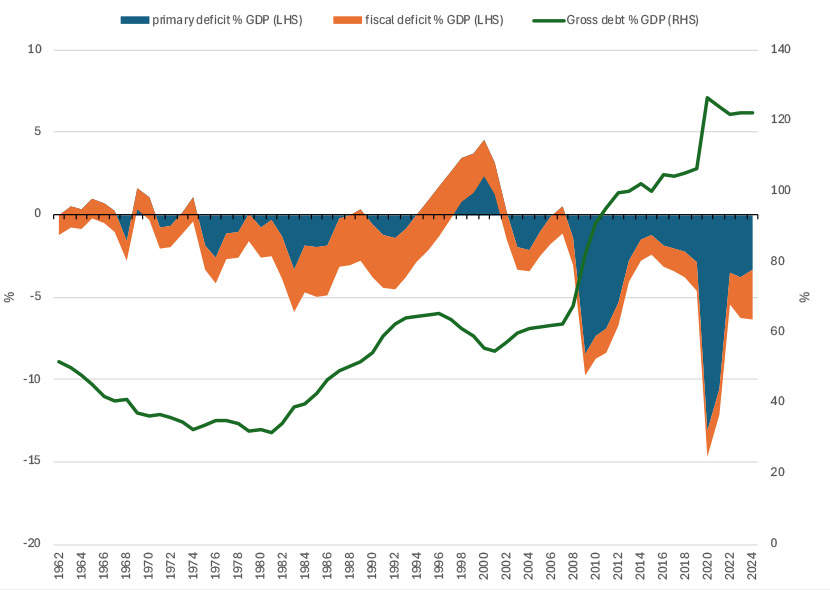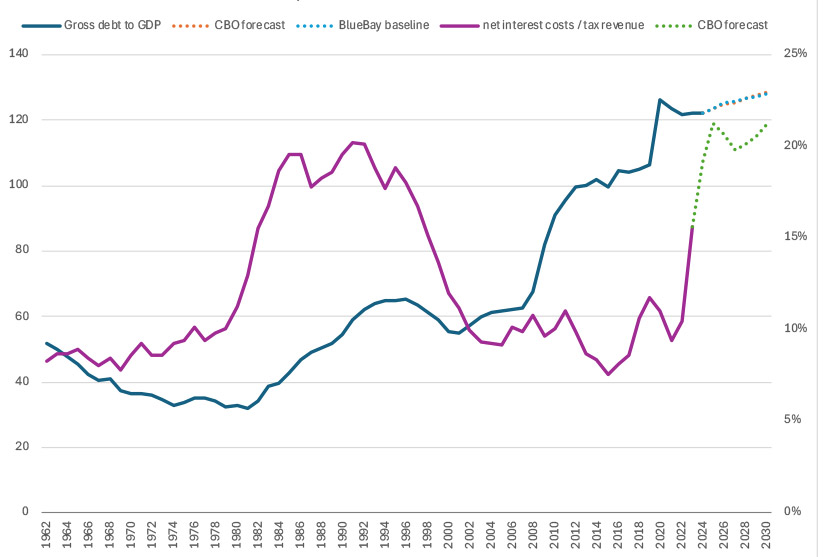Location
Please select your investor type by clicking on a box:
We are unable to market if your country is not listed.
You may only access the public pages of our website.
Key takeaways for bond market investors

Source: Bloomberg, as at April 2025.
It is no coincidence that US exceptionalism has coincided with the loosest fiscal policy in modern history. Large primary deficits funded by debt accumulation enabled the government to pump fresh demand into the economy – and at little cost. Low yields kept the interest burden contained, helping mask the extent of fiscal expansion.
Since 2010, the US has run a primary budget deficit on average of around -4.5% GDP and accumulated more than 30pp of GDP in additional debt (Chart 2). That’s a solid contribution to growth in the first instance, plus any additional delta from fiscal multipliers depending on the productivity of spending. The larger the growth boost, the greater the ability to spend, the more favourable the debt dynamics.

Source: Bloomberg, as at April 2025.
However, the era of cheap debt accumulation has come to an end. Once cheap debt is now becoming expensive as low yielding Covid-era debt is rolled into much higher rates. In Trump’s term in office over the next four years, treasury debt initially issued at yields averaging around 1.6% will have to be refinanced – at levels closer to 4%. This implies that even to keep the fiscal deficit around current levels of -5% to -6% GDP – and thus keep bond supply unchanged at near all-time historic highs – requires at least a 1pp consolidation in the primary deficit. And even then, debt stock continues to amass.
This puts the US budget in a very precarious position. Interest costs are set to absorb more than 20% of tax revenue, a sizeable jump up from the 10% area over the last decade (Chart 3). This is unproductive spending and thus the more of the budget interest costs absorb, the less money is spent towards contributing to GDP growth.

Source: Bloomberg, as at April 2025.
At the same time, structurally we are set to see a reduced government contribution to real GDP growth over the next decade, with mandatory spending on entitlement programs (such as social security and Medicare) to consume a growing share of the budget as more and more baby boomers reach retirement age.
It is worth highlighting that the majority of federal spending does not actually feed into GDP growth. Only spending on services rendered or goods purchased are counted for in G variable of GDP. [GDP = C + I + G + (X – M)]. Transfer payments – to states or individuals, such as social security, unemployment benefits, and Medicare – do not contribute to growth but instead redistribute wealth within the economy. The point here is that fiscal is being squeezed on two fronts and thus even while optically a fiscal deficit of around -6% suggests a very stimulative fiscal policy, the reality is the delta on government contribution to real GDP is on the decline.
All data is Bloomberg, unless otherwise stated
Subscribe now to receive the latest investment and economic insights from our experts, sent straight to your inbox.
This document is a marketing communication and it may be produced and issued by the following entities: in the European Economic Area (EEA), by BlueBay Funds Management Company S.A. (BBFM S.A.), which is regulated by the Commission de Surveillance du Secteur Financier (CSSF). In Germany, Italy, Spain and Netherlands the BBFM S.A is operating under a branch passport pursuant to the Undertakings for Collective Investment in Transferable Securities Directive (2009/65/EC) and the Alternative Investment Fund Managers Directive (2011/61/EU). In the United Kingdom (UK) by RBC Global Asset Management (UK) Limited (RBC GAM UK), which is authorised and regulated by the UK Financial Conduct Authority (FCA), registered with the US Securities and Exchange Commission (SEC) and a member of the National Futures Association (NFA) as authorised by the US Commodity Futures Trading Commission (CFTC). In Switzerland, by BlueBay Asset Management AG where the Representative and Paying Agent is BNP Paribas Securities Services, Paris, succursale de Zurich, Selnaustrasse 16, 8002 Zurich, Switzerland. The place of performance is at the registered office of the Representative. The courts at the registered office of the Swiss representative or at the registered office or place of residence of the investor shall have jurisdiction pertaining to claims in connection with the offering and/or advertising of shares in Switzerland. The Prospectus, the Key Investor Information Documents (KIIDs), the Packaged Retail and Insurance-based Investment Products - Key Information Documents (PRIIPs KID), where applicable, the Articles of Incorporation and any other document required, such as the Annual and Semi-Annual Reports, may be obtained free of charge from the Representative in Switzerland. In Japan, by BlueBay Asset Management International Limited which is registered with the Kanto Local Finance Bureau of Ministry of Finance, Japan. In Asia, by RBC Global Asset Management (Asia) Limited, which is registered with the Securities and Futures Commission (SFC) in Hong Kong. In Australia, RBC GAM UK is exempt from the requirement to hold an Australian financial services license under the Corporations Act in respect of financial services as it is regulated by the FCA under the laws of the UK which differ from Australian laws. In Canada, by RBC Global Asset Management Inc. (including PH&N Institutional) which is regulated by each provincial and territorial securities commission with which it is registered. RBC GAM UK is not registered under securities laws and is relying on the international dealer exemption under applicable provincial securities legislation, which permits RBC GAM UK to carry out certain specified dealer activities for those Canadian residents that qualify as "a Canadian permitted client”, as such term is defined under applicable securities legislation. In the United States, by RBC Global Asset Management (U.S.) Inc. ("RBC GAM-US"), an SEC registered investment adviser. The entities noted above are collectively referred to as “RBC BlueBay” within this document. The registrations and memberships noted should not be interpreted as an endorsement or approval of RBC BlueBay by the respective licensing or registering authorities. Not all products, services or investments described herein are available in all jurisdictions and some are available on a limited basis only, due to local regulatory and legal requirements.
This document is intended only for “Professional Clients” and “Eligible Counterparties” (as defined by the Markets in Financial Instruments Directive (“MiFID”) or the FCA); or in Switzerland for “Qualified Investors”, as defined in Article 10 of the Swiss Collective Investment Schemes Act and its implementing ordinance, or in the US by “Accredited Investors” (as defined in the Securities Act of 1933) or “Qualified Purchasers” (as defined in the Investment Company Act of 1940) as applicable and should not be relied upon by any other category of customer.
Unless otherwise stated, all data has been sourced by RBC BlueBay. To the best of RBC BlueBay’s knowledge and belief this document is true and accurate at the date hereof. RBC BlueBay makes no express or implied warranties or representations with respect to the information contained in this document and hereby expressly disclaim all warranties of accuracy, completeness or fitness for a particular purpose. Opinions and estimates constitute our judgment and are subject to change without notice. RBC BlueBay does not provide investment or other advice and nothing in this document constitutes any advice, nor should be interpreted as such. This document does not constitute an offer to sell or the solicitation of an offer to purchase any security or investment product in any jurisdiction and is for information purposes only.
No part of this document may be reproduced, redistributed or passed on, directly or indirectly, to any other person or published, in whole or in part, for any purpose in any manner without the prior written permission of RBC BlueBay. Copyright 2025 © RBC BlueBay. RBC Global Asset Management (RBC GAM) is the asset management division of Royal Bank of Canada (RBC) which includes RBC Global Asset Management (U.S.) Inc. (RBC GAM-US), RBC Global Asset Management Inc., RBC Global Asset Management (UK) Limited and RBC Global Asset Management (Asia) Limited, which are separate, but affiliated corporate entities. ® / Registered trademark(s) of Royal Bank of Canada and BlueBay Asset Management (Services) Ltd. Used under licence. BlueBay Funds Management Company S.A., registered office 4, Boulevard Royal L-2449 Luxembourg, company registered in Luxembourg number B88445. RBC Global Asset Management (UK) Limited, registered office 100 Bishopsgate, London EC2N 4AA, registered in England and Wales number 03647343. All rights reserved.
Subscribe now to receive the latest investment and economic insights from our experts, sent straight to your inbox.